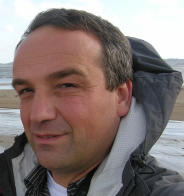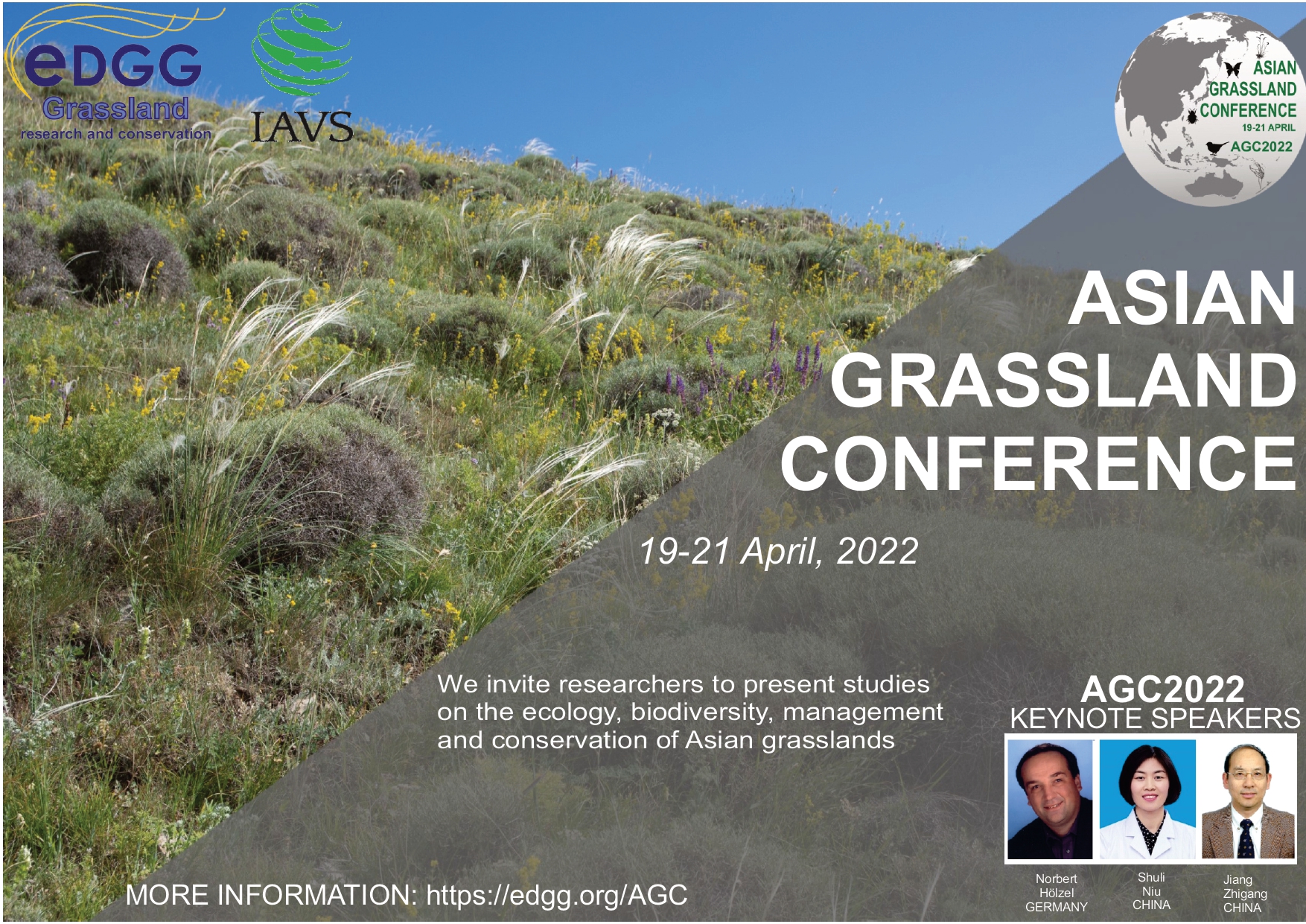Asian Grassland Conference (AGC)
Virtual Conference, 19-21 April 2022
EDIT: Please see second call and conference update at: AGC Second call
First Call
https://edgg.org/AGC
As the largest continent of the world, Asia offers great opportunities for grassland researchers with its vast grasslands, diverse and unique environmental conditions, rich biodiversity, ecological and evolutionary processes some of which are not observed elsewhere. At the same time, it poses great challenges for nature conservation and sustainable livelihoods due to climatic and land use changes. Since 2008, the Eurasian Dry Grassland Group (EDGG) with more than 1300 members from over 60 countries aims to strengthen scientific information exchange and collaboration on Palaearctic grasslands in general, including the organisation of annual Eurasian Grassland Conferences (EGCs). Due to the Covid-19 pandemic, no EGC could be conducted in 2020 or 2021 as a live event. Therefore, we took the opportunity to organise an international online event specifically devoted to the grasslands of Asia. We invite researchers from all over the world to the very first Asian Grassland Conference to present or listen to studies on the flora, fauna, biodiversity, ecology, management and conservation of these precious habitats.
The conference will take place for three-half days on an online platform from 22 to 24 February 2022. We will ensure a broad level of regional representation in this event, highlighting research from less well-known parts of the continent. Besides keynote talks, regular talks and speed talks with posters, we will offer networking events, workshops and happy hours. In conjunction with the conference, we plan Special Features in three international scientific journals.
The participation in the Asian Grassland Conference is free of charge. In autumn 2021, we will launch the conference website with online registration. Further details will be announced in forthcoming issues of Palaearctic Grasslands, via the EDGG mailing list as well as on the conference website (https://edgg.org/AGC). If you don’t want to miss out anything, you can pre-register your interest via e-mail to edgg.agc@nullgmail.com.
We hope to meet many researchers interested in grassland research and conservation in Asia! Colleagues from other continents are, of course, welcome to join us.
Topic and sessions
We intend to cover any aspect of research and conservation in Asian natural and semi-natural grasslands. Below you can find a preliminary session list with short explanations. Presentations on other subjects of grassland research are also welcome.
1. Biodiversity of grasslands: patterns and drivers of a wide range of biodiversity facets
2. Ecology and taxonomy of plant and fungi species in grasslands: studies with a focus on individual species
3. Ecology and taxonomy of grassland vertebrate species: studies with a focus on individual species, including wildlife management
4. Ecology and taxonomy of grassland invertebrate species: studies with a focus on individual species
5. Grassland ecosystem under global change, including climate change, land use change, habitat destruction, biotic invasions and eutrophication
6. Functional ecology of grasslands
7. Grassland conservation, management and restoration
8. Vegetation and habitat classification of grasslands, at any level and with any approach
9. Remote sensing, mapping and modelling of grasslands
10. Livelihoods and sustainability of pastoral communities, including payment policies for conservation
Further details on the sessions will be provided in the Second Call.
Keynotes
AGC will offer keynote presentations which will provide comprehensive, enlightening and inspiring information on grasslands. At the beginning of each day, a distinguished scientist will present a keynote talk. We are pleased to welcome three brilliant scientists presenting on vegetation ecology, wildlife ecology and global change.

Prof. Norbert Hölzel
Institute of Landscape Ecology, University of Münster, Münster, Germany
Prof. Hölzel’s research interests in grassland ecology spans from restoration, landscape ecology, land use-biodiversity and ecosystem functioning interactions, vegetation patterns, ecology of rare and endangered species, seed ecology and the effects of global change on landscapes, habitats and species. He has lead or worked in several projects in Eurasia. His research group works intensively on a big-scale, long-running project in Asia, i.e. land use change and landscape dynamics in Western Siberia and Kazakhstan. Furthermore, he is a leading scientist in a long-term biodiversity research and monitoring project of Germany, the Biodiversity Exploratories. He is a member of the editorial board of several scientific journals and scientific organizations. His talk will focus on the impact of Post-Soviet land-use change on Central Asian steppe ecosystems.
https://www.uni-muenster.de/Oekosystemforschung/mitarbeiter/hoelzel.html
https://scholar.google.com/citations?user=5gVCB5cAAAAJ&hl=de
https://www.researchgate.net/profile/Norbert-Hoelzel

Prof. Shuli Niu
Institute of Geography and Natural Resources, Chinese Academy of Sciences, Beijing, China
Dr. Shuli Niu’s research focuses on ecosystem carbon and nitrogen cycles and their coupling in response to global change. By setting up a few global change manipulative experiments in grasslands, her group has comprehensively studied biodiversity, community structure, and ecosystem functions in response to multiple global change factors. She has (co-) authored over 160 scientific articles that have been cited over 8500 times (data from Google Scholar). She is also in the chair board of AsiaFlux and serves as associate editors for the journals of Ecology Letters, Functional Ecology, and Journal of Geophysical Research-Biogeosciences. Her keynote talk will be about the response of alpine grassland to global change gradient.
http://sourcedb.igsnrr.cas.cn/yw/zjrck/201303/t20130306_3787558.html
https://scholar.google.com/citations?user=f7PNK1QAAAAJ&hl=en&oi=ao
https://www.researchgate.net/profile/Shuli_Niu2?sorting=recentlyAdded

Prof. Jiang Zhigang
Institute of Zoology, Chinese Academy of Sciences, Beijing, China
Prof. Jiang’s research focuses on the endangered species of wild fauna, particularly the ecology, diversity, behavior and conservation of mammals. He authored more than 300 scientific publications and 20 books on those subjects, including: Principles of Conservation Biology, Field Methods for Nature Conservation, Principles of Animal Behavior and Methods of Species Conservation and Mammalian Diversity and Geographic Distribution in China.
He is affiliated with commissions and institutes working on red lists, wildlife and endangered species conservation and national parks.
His keynote talk will focus on the wild ungulates on the grasslands in China, their status and conservation. China is the country with the most diverse ungulate species in the world (71 species, 21% endemic), of which, more than one third (25 species) are inhabiting various grassland habitats. Moreover, several are endangered and flagship species. The speaker will explore the diversity, distribution and conservation of the wild ungulates and ask the question of how to achieve conservation goals on grasslands transforming into production substances.
http://english.klaecb.ioz.cas.cn/research/groups/jiangzhigang/PI/
https://scholar.google.com/citations?user=1J3cc6oAAAAJ&hl=ja
https://www.researchgate.net/profile/Zhigang-Jiang
Side events
Apart from scientific presentations, the AGC will provide plenty of space for side events that facilitate individual exchange and networking. Below you can find short descriptions of those events already planned. Details will be provided in the Second Call. If you would like to organise a specific side event within the framework of AGC, please get into contact with the Organising Committee (see below).
- Happy Hour: At the end of the daily sessions, the participants are invited to join a happy hour where they can interact with other participants freely and talk. For this purpose, we will offer a virtual event space where people can meet and talk. Guests will be able to find and talk to the persons they would like to contact or join to conversations of small groups.
- Introducing the Eurasian Dry Grassland Group (EDGG): For newcomers we will present our organisation with its multitude of activities, such as the Eurasian Grassland Conferences, the EDGG Field Workshops (research expeditions), our diamond open access journal Palaearctic Grasslands, our Special Features and edited books, our vegetation-plot database GrassPlot, our website and our online tool GrassPlot Diversity Explorer. A good chance to get into contact with the EDGG Chairs.
- Meet the Editors: This interactive event aims to bring participants and editors of good journals together. The participants can ask their questions about all stages of publishing a scientific article, such as submission, evaluation criteria, language issues, or how to reply to reviewers. The participants will have the opportunity to learn more about the “kitchen” of publishing. On the podium there will be several experienced editors from a wide range of international journals:
– Jürgen Dengler (Chief Editor of Vegetation Classification and Survey, Guest Editor of Journal of Vegetation Science and Tuexenia, Editorial Board of Applied Vegetation Science)
– Péter Török (Editor of Restoration Ecology, Applied Vegetation Science, Flora and Land Degradation & Development)
– Orsolya Valkó (Editor of Biological Conservation and Frontiers of Ecology and Evolution, Guest Editor of Hacquetia)
– Jianshuang Wu (Editor of Frontiers in Ecology and Evolution and Frontiers in Environmental Science) - Initiation of IAVS Regional Section(s) for Asia: EDGG is an official Working Group of the International Association for Vegetation Science (IAVS; www.iavs.org). While IAVS has several well-organised Regional Sections or Working Groups for Europe, North America, Latin America and the Caribbean as well as Africa, vegetation ecologists in the largest of all continents are currently not formally organised across borders. We will discuss whether there is sense/need to establish a network for Asian vegetation ecologists within IAVS, whether one or several Regional Sections would make sense, what could be aims of such Regional Sections and who would like to get active within these. We intend to invite also selected vegetation ecologists from Asian countries specialised in forests, wetlands, alpine, segetal and urban habitats.
- Workshop on the long term monitoring of grassland ecosystems: The aim of this workshop is to exchange information and ideas to generate a multi-purpose regional time-series database of Asian grasslands. The participants will exchange information and ideas on identification of (i) a common goal, objectives and strategy for a standard monitoring across Asia, (ii) a network of important grasslands across the continent, (iii) previously studied grasslands that can be directly used for further monitoring, (iv) establish a baseline towards standard guidelines and protocols for collecting baseline data for grassland monitoring in Asia.
- Workshop on the vegetation typologies in Asia and their crosswalks to phytosociological syntaxa: The aim of this workshop is to better understand vegetation typologies of Asia from a global point-of-view. Specifically, we would like to harmonize Asian topologies with that of GrassPlot, an EDGG-associated database of multi-scale vegetation-plot data of Palaearctic grasslands and other open habitats (https://edgg.org/databases/GrassPlot). All the vegetation plots incorporated in the GrassPlot database are assigned to a vegetation typology, which include 22 vegetation types grouped into six coarse units (https://onlinelibrary.wiley.com/action/downloadSupplement?doi=10.1111%2Fjvs.13050&file=jvs13050-sup-0002-AppendixS2.pdf ). While this two-level classification, along with its syntaxonomic crosswalk, is reasonably tested for Europe, many “grey” and undefined zones remain for the Asian continent, both on the side of the GrassPlot classification and on the side of the syntaxonomic classification. Any contribution about the phytosociological classification of grasslands and other open habitats from any part of the Asian continent, as well as any critical review of the so far applied GrassPlot typological classification are highly welcome to this workshop. If successful, a publication could arise from such a workshop.
- Young Investigator Competition: The aim is to award young scientists for an excellent presentation of their research. For these purposes, young scientists (less than 30 years old) will be asked during registration if they wish to participate in the contest. During her/his presentation, the applicant needs to explain clearly her/his contribution to the presented work.
- Asian Grassland Photo and Video Competition: This event aims to present the beauty and diversity of grasslands in Asia, where scientists can challenge each other with photographic and video contributions. A jury will select the best contributions, which will be presented in the concluding session of the AGC, on the EDGG website and in the subsequent issue of Palaearctic Grasslands.
- Notice board: We are planning to set up a notice board where participants can share their announcements (including job posts, events etc.) with all participants. All announcements will be collected in advance after the Second Call.
During the registration, you will be able to register for these (optional) side events. Depending on these registrations, we will arrange them in time and, if interest in some of them should be too low, reserve the right not to conduct them.
Special Features
EDGG is regularly publishing Special Features (SF) in international journals on topics related to ecology, biodiversity, classification, conservation and management of Palaearctic grasslands. Publishing in EDGG Special Features typically comes with significant visibility and therefore our Special Feature articles on average receive more citations than “normal” articles in the respective journal. Therefore, we are planning to organize three SFs to give the participants the opportunity to make their research more visible in a topical SF. Depending on the subject and quality of their presentation, participants likely can chose among three SFs in international, peer-reviewed journals:
- High-level journal (Biodiversity and Conservation under consideration) (Chair of Guest Editors: Didem Ambarlı): For the outstanding contributions of the AGC.
- Hacquetia (approved; Chair of Guest Editors: Orsolya Valkó): For good contributions that are not outstanding enough for a leading international journal.
- Vegetation Classification and Survey (approved; Guest Editors: Jürgen Dengler & Arkadiusz Nowak): For any paper that deals with the development or application of a classification system of Asian grasslands.
Registration and costs
The registration and abstract submission is planned to be launched in September 2021 together with the Second Call. The registration and all side events will be free of charge to ensure maximum participation without financial barriers. Participants can pre-register by sending their name, e-mail address and affiliation to edgg.agc@nullgmail.com. We will save the contact information and contact you via an e-mail when the registration is open.
Scientific Committee
Alla Aleksanyan, Institute of Botany after A.L. Takhtajyan NAS RA, Yerevan, Armenia
Didem Ambarlı, Düzce University, Turkey
Kuber Bhatta, University of Bergen, Norway
Idoia Biurrun, University of the Basque Country UPV/EHU, Bilbao, Spain
Tatyana M. Bragina, Kostanay Regional University named after A. Baitursynov, Kazakhstan
Elena Bykova, Academy of Sciences of the Republic of Uzbekistan, Tashkent, Uzbekistan
Iwona Dembicz, University of Warsaw, Poland
Jürgen Dengler, Zurich University of Applied Sciences (ZHAW), Wädenswil, Switzerland
Jiri Dolezal, Czech Academy of Sciences, Prague, The Czech Academy of Sciences, Czech Republic
Choimaa Dulamsuren, University of Freiburg, Germany
Riccardo Guarino, University of Palermo, Italy
Monika Janisova, Slovak Akademy of Sciences, Banská Bystrica, Slovakia
Anna Kuzemko, National Academy of Sciences of Ukraine, Kyiv, Ukraine
Rocco Labadessa, National Research Council (CNR), Italy
Frank Yonghong Li, Inner Mongolia University, Hohhot, China
Diqiang Li, Chinese Academy of Forestry, Beijing, China
Alireza Naqinezhad, University of Mazandaran, Bābolsar, Iran
Arkadiusz Nowak, Polish Academy of Sciences Botanical Garden, Opole, Poland
Ilya Smelansky, Siberian Environmental Center, Novosibirsk, Russia
Marcelo Sternberg, Tel Aviv University, Israel
Péter Török, University of Debrecen, Hungary
Atushi Ushimaru, Kobe University, Japan
Steven Venn, University of Helsinki, Finland
Karsten Wesche, Senckenberg Museum of Natural History Görlitz, Germany
Jianshuang Wu, Chinese Academy of Agricultural Sciences, Beijing, China
Organizing Committee
For your questions, suggestions and requests, please contact the Organizing Committee:
Didem Ambarlı (Chair), Düzce University, Turkey, didem.ambarli@nullgmail.com
Alla Aleksanyan, Institute of Botany after A.L. Takhtajyan NAS RA, Yerevan, Armenia, alla.alexanyan@nullgmail.com
Jürgen Dengler, Zurich University of Applied Sciences (ZHAW), Wädenswil, Switzerland, dr.juergen.dengler@nullgmail.com
Frank Yonghong Li, Inner Mongolia University, Hohhot, China, lifyhong@null126.com
Stephen Venn, University of Helsinki, Finland, stephen.venn@nullhelsinki.fi







